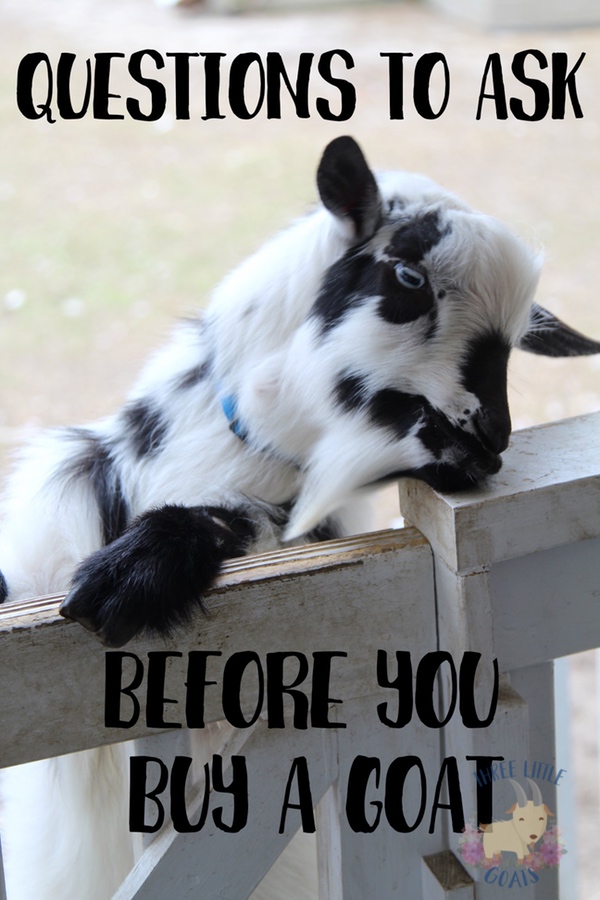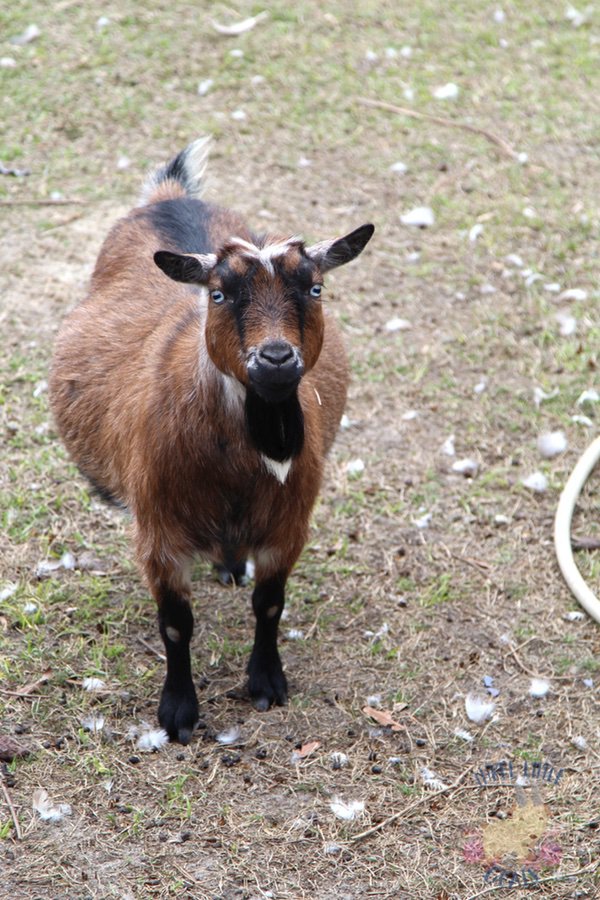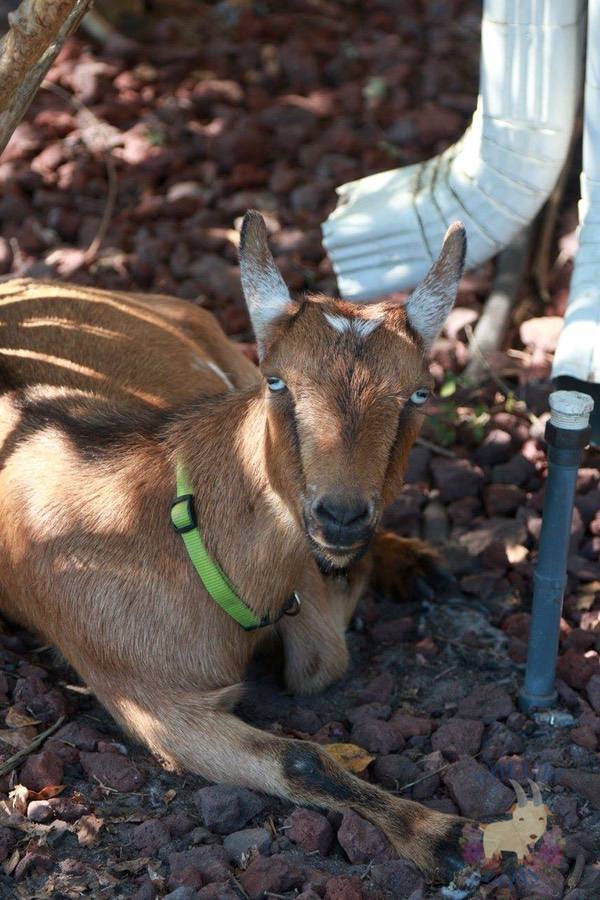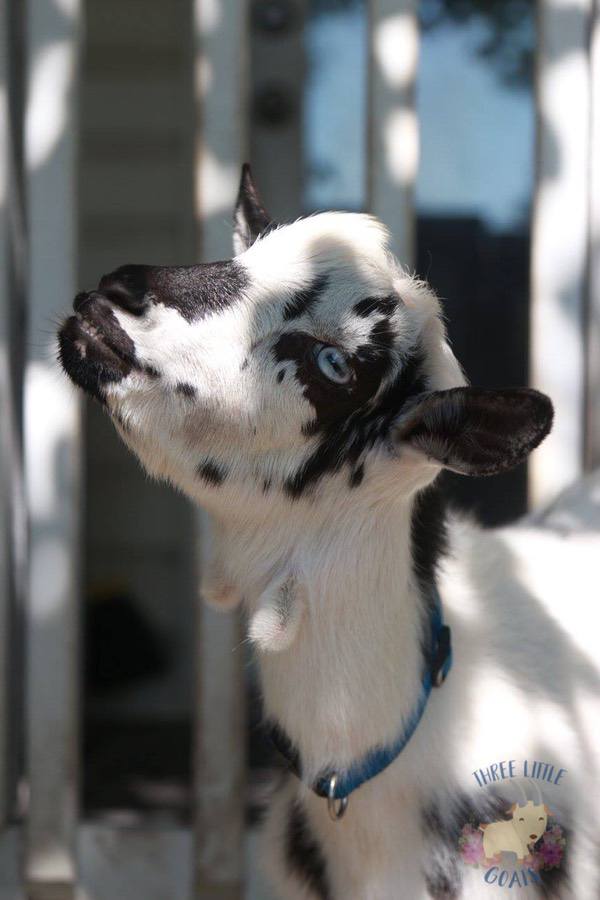This post may contain affiliate links, to learn more about them, check out our Disclosure.
Questions to Ask Before You Buy A Goat
Buying a goat can feel a little overwhelming. While there are always goats available, it is important to do your research before you buy. While that cute little doeling on Craigslist may be super cute, there are questions you should always ask before purchasing. This is true for both your first goat, and any goats that you may want to add to your herd. To make sure you are getting the best goat for your buck, here are a few questions to ask before you buy a goat.

Here are a few questions to ask before you buy a goat:
Herd Health
You always want to get a good feel for the herd health that you are buying from. Some questions you may want to ask:
Do you vaccinate? If so, which vaccines?
Some breeders vaccinate, while others do not. It is really a preference. Smaller breeders may not have a need to vaccinate because they can manage disease and illness on a case-by-case basis. While other larger breeders may vaccinate to prevent disease in a larger herd that does not get a lot of one on one time.
Has your herd been tested for any diseases?
There are some diseases that are genetic, such as Caseous Lymphadenitis (CL). This disease can be contagious to other goats, and can be passed to humans if the goat has a cyst that has burst. Another disease that many test for is Johne’s disease. If you do buy a goat from a herd that has not been tested, and you are introducing them to your other goats, it is always good to quarantine them and get them tested before introducing them into an established herd.
Have you had any unexplained illnesses in your herd?
This can give you an idea of the breeders herd health. I often joke to my hubby that goats just look for ways to die. The worst thing that can happen is you buy a goat, and it dies within the first few weeks. By asking this question, it can help you to determine if there are any red flags raise.
How often do you worm? What do you use?
Some breeders worm on a schedule, while smaller herd owners only worm on a case-by-case basis. If they only do it when needed, ask when the last time the goat you are looking at was wormed.
What do you feed them?
This is important for two reasons, one is to ensure you can transition them if you plan on feeding something different. Another is to ensure they are getting the right feed. When I bought Morty, I was shocked to see that they were free feeding sweet feed to their herd. It made me a little nervous, simply because too much sweet feed in males can cause Urinary Calculi, which can be deadly. But, because I knew this, I knew that I needed to correct his diet as soon as possible and get his phosphorous to calcium ration corrected before it caused problems.

About the Goat
Not only do you want to ask general questions about the herd health, but specifics about the goat as well. This is especially important if you are buying goats for a specific reason, such as for milk or meat. Some questions include:
[adsense_hint]
How much milk does the Dam produce?
If you are buying a buck for breeding, or a doe for milk, you will want to ask this question. This will give you an idea of how much milk you may get from either the Dam, or the Bucks offspring.
If they are meat goats: What is your average market weight for your goats?
Again, this will give you an idea of what to expect from any offspring.
Are your goats registered? If so, where?
There are a few different registers that a goat can be registered with; some only register dairy goats, while others register any goat. Some registries include, but are not limited to:
- American Dairy Goat Association
- American Goat Society
- Nigerian Dwarf Goat Association
- Miniature Dairy Goats
Have you had the milk tested?
Just like testing for diseases, you can have a goat’s milk tested. This can give you an idea of the quality of the milk being produced in the herd.
Are the goats polled or disbudded?
Horns may or may not be a deal breaker. If you are looking for goats without horns though, it is important to find out if the breeder has polled goats (naturally born without horns), or if they are disbudded.

Look over the goat
After you have asked all of your questions. It is important to thoroughly look over the goat.
Teats
If you are looking for a Doe to milk, be sure to check the teats. You do not want a goat with small teats, especially for milking; because it may be difficult to hand milk. Also make sure they do not have a slit teat, as this can cause difficulty as well.
Hooves
Give the goats hooves a good look over, all four of them. Be sure to check for any foot rot, and to see if the hooves have been recently trimmed.
Body
Check for any lumps, especially in the lymph areas, this can be a sign of CL. Also look for any skin lesions, or abrasions. This is also a good time to check over the coat, to ensure they are not carrying fleas or lice.
Buying a goat is always exciting, but it is important to do your research first. Not only will this save you money, but also heartache. An unhealthy goat can go down hill quickly and die without warning. This can also prevent from an unexpected disease running rampant through your herd.

Do you have any other questions to ask before you buy a goat? Let me know if the comments below. Be sure to check out our other goat articles to learn more about goats!


